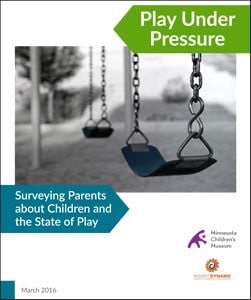Play Under Pressure Media Release

Children Often Too Busy to Play, Survey of Parents Finds
Hectic Family Schedules Crowd Out Play Time; Less Play Reduces Opportunities for Children to Develop Essential Skills
St. Paul, Minn. – Busy family schedules, screen time and safety worries are putting a squeeze on play time for kids, a new survey of Twin Cities parents finds.
Less time playing means fewer opportunities for children to develop the important skills they need to thrive now and throughout their lives.
“The research is absolutely clear: Rich and deep learning happens through play,” said Dr. Megan Gunnar, director of the Institute of Child Development at the University of Minnesota and chair of the Museum’s Research Advisory Council. “If you want to help your children to thrive in a constantly changing world where they will need to invent and reinvent themselves in order to succeed, make more time for play.”
Minnesota Children’s Museum published the survey results in a report titled “Play Under Pressure.” The Museum commissioned the survey to gain insight about parents’ attitudes regarding play during an era in which discussions about screen time, school readiness, over-scheduled kids and parenting styles are commonplace.
More than 1,000 parents and other caregivers completed the survey, which was developed in partnership with the Museum’s Research Advisory Council and conducted by public opinion research firm InsightDynamo.
Some key insights include:
Parents know play benefits children…
- Most parents believe play helps children develop essential skills (rated No. 1 reason children should play)
- Most parents view child-directed play (as opposed to adult-led activities) as crucial to their child’s development (87 percent agree)
But families face a variety of pressures…
- Hectic family schedules, lack of nearby playmates and safety concerns when children are outdoors limit play time (top 3 reasons cited)
- Kids spend too much time with electronic devices (88% agree)
- Many parents worry children will “fall behind” if they don’t take part in structured, adult-led activities (45% agree)
Which means play time often gets crowded out…
- Children don’t get enough time to play (70% agree)
- Parents played more when they were kids (82% agree)
- Parents want their children to spend more time in child-directed play (76% agree)
The survey findings align with national research showing that play time is declining. On average, the time children spend playing has fallen eight hours per week since the 1980s, according to research cited in the “The Power of Play: A Research Summary on Play and Learning,” written for Minnesota Children’s Museum.
The Museum is using the survey findings to further develop initiatives to raise awareness about the benefits of play throughout life. In fall 2015, the Museum launched #PlayMoreMN, a movement to urge parents and our entire community to recognize and celebrate the value of play – for both children and adults.
Minnesota Children’s Museum envisions a future in which kids and adults play more. The Museum sees our community thriving as a happier, healthier and more innovative place through the radiant power of play.
“Play is sometimes viewed as frivolous or something to be done in moderation,” said Nichole Polifka, the director of learning and impact at Minnesota Children’s Museum. “But play is a big deal. Play is a necessity. The learning that happens through play sticks with children.”
Extensive research shows that play cultivates lifelong competencies, including critical and creative thinking, communication, collaboration, confidence and more.
The Museum believes:
- Play is not “just fun” or “nice to have” – it’s essential
- Play is learning
- Child-directed play builds skills that prepare children for success in school and beyond
Parents and other caregivers who want to support the learning that happens through play can:
- Make play time a priority
- Learn more about the benefits of play and what adults can do to enhance the learning that happens through play
- Join the #PlayMoreMN movement: Take a stand that says making time and space for play is important for your family and the entire community
Minnesota Children’s Museum is committed to sparking children’s learning through play. The Museum views all play as beneficial, but considers open-ended, child-directed play – or “powerful play” – the most impactful. The Museum believes “powerful play” pairs play and learning as lifelong partners. It celebrates children as their own agents of learning.
Powerful play shares three aspects:
- Personal motivation: A child wants to be there. The activity is enjoyable, relevant, interesting and purposeful. The play stems from a child’s own desires and brings satisfaction and/or pleasure.
- Mind and body engagement: A child is actively involved both mentally and physically. The play, and the learning, is a whole-body experience.
- Individual exploration: A child explores freely without the limitation of being expected to do things the “right” way or a certain way. The process is the focal point, not an end result or outcome.
Media Resources

Play Under Pressure: Survey Report
#PlayMoreMN Movement
The Power of Play Research Summary
Photos and Logos
Notes about the Survey Methodology
Minnesota Children’s Museum partnered with InsightDynamo, a consumer insights firm, to survey Twin Cities parents about play. More than 1,000 adults in the Minneapolis-St. Paul metropolitan area completed the survey, which was conducted in July 2015 via an online survey platform. Respondents were recruited from a pool of general consumers and members of Minnesota Children’s Museum. The Museum and InsightDynamo developed the survey questions with input from the Minnesota Children’s Museum Research Advisory Council, a panel created in partnership with the Institute of Child Development at the University of Minnesota.
About Minnesota Children’s Museum
Minnesota Children’s Museum is dedicated to sparking children’s learning through play. Our vision: “Kids play more. Adults do, too. We thrive as a happier, healthier and more innovative community through the radiant power of play.” The Museum, which first opened in 1981 and moved to downtown St. Paul in 1995, serves more than 460,000 visitors each year at its locations St. Paul, Rochester and Mall of America, and reaches thousands more across the state through Smart Play Spots, Storyland exhibits and other programs. The Museum is consistently rated as one of the top children’s museums in the country by national media outlets such as Forbes and Parents and was named as a finalist for an Institute of Museum and Library Services Medal of Service, the nation’s highest honor conferred on museums and libraries. Online: MCM.org
About Insight Dynamo
Too often, research companies simply deliver data without clarity or meaning, which can lead to confusion and misinterpretation, and ultimately fails to solve a business problem. Our belief is that providing information is not enough—you need to be able to turn information into insights, and explain what those insights mean. And with 30 years of combined experience in this field, we are able to do just that. We founded InsightDynamo as a high-touch, full-service and flexible insights consulting firm that delivers custom programs, tailored to you—your industry, your culture, your one-of-a-kind challenges. Think of us as an extension of the companies we serve, with an overriding goal of using our expertise to provide actionable insights that will make a real and pronounced difference to you and your strategic goals. Online: insightdynamo.com

